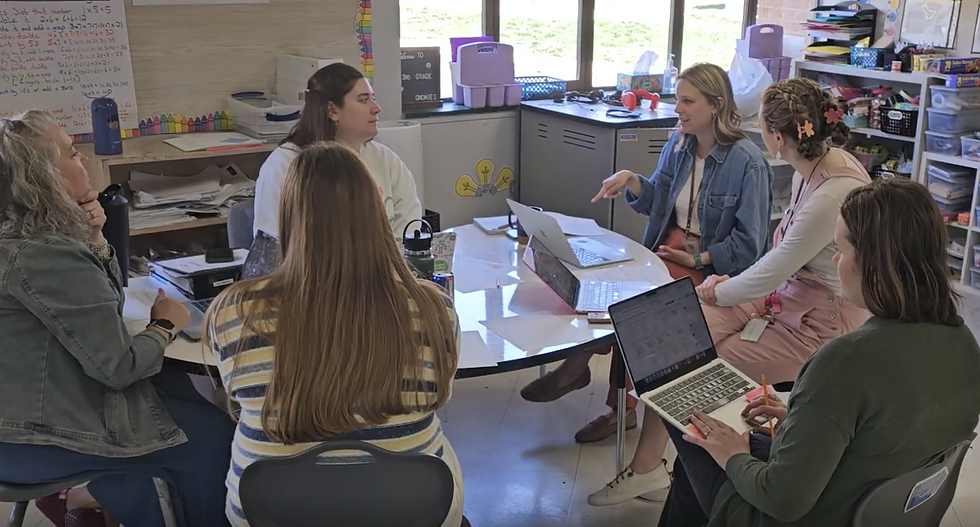The Teachers Who Changed Us: How Meaningful Learning and Relationships Shape Great Teaching
- ACP Staff

- May 6, 2025
- 4 min read
Updated: May 6, 2025

How Meaningful Learning and Relationships Shape Great Teaching
At Applied Coaching for Projects, we believe that great teaching is about more than delivering content, it’s about building connection. This Teacher Appreciation Week, we’re reflecting on the educators who changed our lives, long before we stepped into classrooms ourselves.
Behind every one of us at ACP is a teacher who made learning meaningful. They made us feel seen. They named our strengths, challenged us to grow, and reminded us that learning can be joyful and rigorous. These teachers didn’t just make us feel good. We remember them because we learned deeply. What they taught stuck with us.
So it’s no surprise, really, that many of our blog posts, strategies, and professional learning sessions are rooted in these same ideas: relationships, belonging, trust, and meaningful academic challenge. The teachers who shaped us are the very reason we do this work. They showed us what excellent teaching can look like—and why it matters.
We asked our team to share stories about the teachers who impacted them most. As we read through each reflection, something powerful emerged: clear and consistent patterns across decades, grade levels, and personalities.
These weren’t just stories of academic success. They were about being seen, challenged, and believed in. These teachers built trust and created belonging. They showed up with care and left a mark that still lingers.
What follows are a few of those themes, told through the voices of our team.
The Teachers Who Saw Us
Some teachers have a way of making you feel like you truly matter, not just as a student, but as a whole person. Their belief in you can plant a seed that grows for years.
Alicia Peletz shared how her 9th-grade history teacher made every day feel like “an adventure to explore the past,” where learning—not test scores—was the priority. “I still have my notebook from her class,” Alicia says, “because even back then, I knew I wanted to be just like her in the classroom one day.”
Kristy Lathrop reflected on a 5th-grade teacher who truly saw her. “She took the time to learn my interests, believed in me, and gently pushed me to grow. Her example shaped how I see every student.”
That kind of student-centered care—knowing learners beyond their academic profile—is something we strive for every day. Read more in our blog: Make Your Class Inviting for All: Inclusive Classroom Strategies.
The Teachers Who Named Our Strengths
For many of us, it was a single comment, a piece of feedback, or a well-timed nudge that made all the difference. These teachers gave us language for our potential.
Gina Olabuenaga, Ed.D., shared the impact of a poetry teacher who coached her with clarity and care. “He named my strengths and believed in me. That belief helped me find my true calling as an educator.”
Cheryl Dobbertin remembers the moment her English teacher told her she could be a writer. “Words are powerful—and so are teachers who communicate high expectations with belief.”
Explore how asset-based instruction is central to our approach in: Culturally Relevant Pedagogy or Culturally Responsive Teaching? It can be both!.
The Teachers Who Created Belonging
Sometimes it’s the little things—a greeting, a nickname, a classroom routine—that make students feel like they belong. These teachers made school feel like a place where we were welcome.
Tara Harvey recalled her second-grade teacher who rode a motorcycle, renamed reading groups with fun color names, and made every student feel like the smartest kid in the room. “Her creativity and care still stick with me today.”
We explore how that emotional tone is foundational to student success in Supporting a Culture of Learning Through SEL.
The Legacy We Carry Forward
Some of these teachers didn’t just shape who we were as students—they influenced who we became as educators. Their legacy lives on in how we lead, teach, and coach today.
Jacqueline Arce, Ed.D., spoke about her mentor teacher during certification. “She was the coolest teacher I’d ever known and had an incredible way of balancing content with relationship-building. I still try to channel her energy in my work today.”
Christine Trahms added, “I’ve had a front row seat to the impact of a caring teacher. The teacher-student relationship is, without a doubt, one of the most special relationships there is.”
To dive deeper into the kind of culture that sustains this legacy, visit Learner-Centered Culture.
Gallery of Gratitude
To honor the teachers who made a lasting impact on our lives, we created a visual gallery featuring quotes from each member of our team. These tributes reflect a shared truth: teaching is relationship work, and the ripple effects are real—even if they’re not always visible.
Take a moment to scroll through and celebrate the educators whose care made all the difference.
A Call to Celebrate—and Continue the Work
These stories aren’t just reflections. They’re a reminder of what’s possible when we lead with care, connection, and intention. This week, as we celebrate the teachers who shaped us, we’re also committed to helping today’s educators create classrooms where all students feel valued and capable of growth.
But let’s be real, teachers deserve more than a themed breakfast or a single week of recognition. They deserve to be valued every day, not just appreciated when it’s marked on a calendar. The impact they make is ongoing, and the support they receive should be too.
That’s why it matters to keep telling these stories—not just during Teacher Appreciation Week, but all year long. Some teachers change lives without ever knowing it. Most never hear how deeply they shaped a student’s life. If our team’s stories show anything, a great teacher’s impact can last for decades.
So, from all of us at ACP: thank you for showing up, caring, and for changing lives—whether you hear it enough or not.
At ACP, we are committed to transparency in our content creation. Learn more in our AI Policy.




















Comments